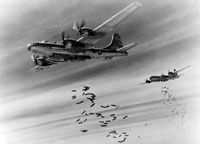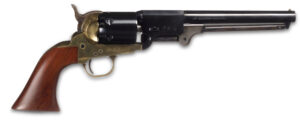Over the centuries, weapons and missiles have contributed many expressions to the civilian vocabulary. A relatively recent example is weapons-grade, an adjective coined by the Atomic Energy Commission in 1952 for quality plutonium, pure enough for use in nuclear weapons. The military expanded the term to apply to biological agents as well, and not long after that civilians picked it up.
Our lexicographer looks at words derived from weapons
In 2001, the American Dialect Society nominated the term as one of the “most useful” of the year. Weapons-grade has been applied to just about anything or anybody. Weapons-grade chili peppers are extremely spicy, referring to an automobile’s acceleration as weapons-grade pickup means it zooms off the line, while Placido Domingo’s weapons-grade voice is outstandingly good.
Of much older origin but with a similar meaning is the term high-caliber, which since the 16th century has described the diameter of a gun’s bore. Actually, gun barrels are described in terms of large or small. Ballistically, the term is meaningless. Nevertheless, at about the same time the phrase became common with guns, it began to apply to high social standing, as well as to ability or merit or worth, as in “She invited only high-caliber executives to the wedding.” This usage remains current, although it is heard less often.
A friend with numerous health concerns frequently consults a medical specialist. She always describes that doctor as a hotshot in the field. The best shot for rifles was made from molten lead. Dropped from a tall tower into a vat of water, the lead droplets would form into perfect spheres in the air, and then solidify in the cooling water. Ammunition has been heated as early as the siege of Cherbourg in 1418, to set afire combustible targets such as ships or wooden forts. In the military, the term was applied to a hot-tempered troublemaker as early as 1600. Three centuries later, it came to mean a flashy or cocky person, and somewhat later a person with superior skill. It is also used adjectivally, as in a 1995 morning news program describing “A hotshot rookie turning heads on and off the tennis court.”
A hotshot tennis pro may well bombard students with balls or fire a volley of instructions. The verb “to bombard” originally referred to discharging bombards, the earliest type of cannon, originally for hurling stones. The word became a verb by about 1600, meaning to batter with shot to destroy or disable the enemy. The Duke of Wellington so used it in an 1813 letter, saying, “If the town is to be bombarded, it may as well be done from the sand hills.” Today the expression is used in much the same way, but its meaning is also extended. For example, “During the election campaign, we were bombarded by ads for each candidate.”
From the late 1500s, firing a volley meant to simultaneously discharge a number of weapons. About the same time, the verb phrase “to volley” meant to utter a rapid succession of words, a usage no longer very common. In tennis, however, a volley is a ball hit back to the opponent before it bounces. A bombardment is sometimes described as a barrage, that is, continuous artillery fire concentrated in a given area, so intense as to prevent the enemy from advancing, retreating, or responding in any way. This expression dates from World War I, as does its figurative use. For example, “Popular with the students, the coach was greeted with a barrage of cheers as she mounted the podium.”
The bigger the gun, the more powerful is its impact. The expression big guns began to be applied to persons of importance or great eminence in the 19th century. Charles Dickens so used it in an 1867 letter: “The college mustered in full force, from the biggest guns to the smallest.” It may also be put as bringing out the big guns, as in “When they come to discuss a merger with our company, let’s bring out the big guns, from the CEO on down.”
The news of an impending merger may come as a bombshell to some employees. Using the phrase “to drop a bombshell” for suddenly delivering unexpected news dates from shortly after World War I and referred to the physical devastation falling bombs could cause. A couple of decades later, “bombshell” was applied to a very attractive woman, and in 1940 came blonde bombshell, used to describe an attractive, sexy woman with blonde hair such as the movie actress Jean Harlow, who starred in the 1933 movie Bombshell.
Christine Ammer is the author of several dozen wordbooks, including The American Heritage Dictionary of Idioms (2001).






